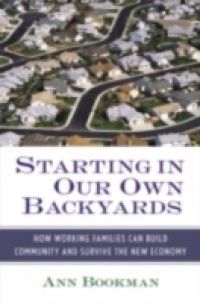For close to five years, Bookman gained access to the lives of forty biotechnology workers and their families. She documents how their inflexible schedules strain their family lives, and how their lack of job security has propelled them to seek support outside of the workplace. She discovered that these workers are building new forms of community to buffer the ups and downs of the 'new economy'. They are creating durable support systems - via childcare centers, religious institutions, schools, neighborhood groups, and parent-to-parent networks - countering the view that community involvement is declining precipitously.Bookman argues that current debates about civic engagement can only be resolved by understanding the new realities of work and family. These changes demand that we expand social responsibility for families, strengthen community institutions, and develop new models for combining paid and unpaid work. And as she shows in her vivid and perceptive analysis, employers, unions, government, faith-based institutions and community groups all have a role to play in supporting working families and reinvigorating civil society.

